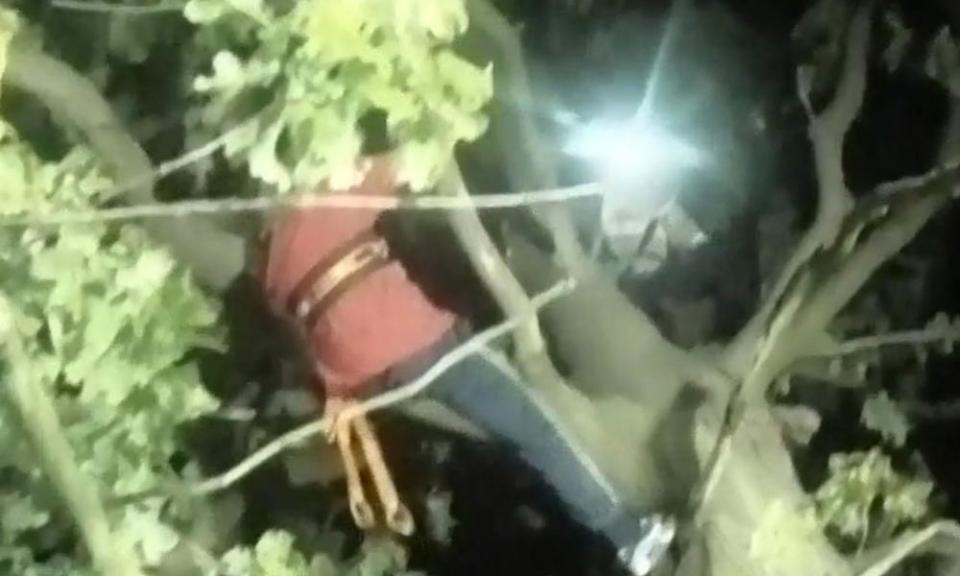Support network and disguises helped Joseph McCann evade police for so long

On 21 April, at half past three in the morning, Joseph McCann abducted a young woman outside a nightclub. He was not caught until more than two weeks, and 36 offences, later. By then he was the most wanted man in the country.
The search for McCann, who was convicted for a series of horrific crimes against women and children on Friday, ended with a manhunt involving hundreds of officers and the wanted man finally discovered hiding in a tree. For the 15 days between, as police gradually made connections between the attacks, they believe that McCann relied on a network of associates who were willing to hide him from officers across the country.
His first three attacks, in Hertfordshire, then east and north London, led to a £20,000 reward being offered as police named McCann as their prime suspect.
McCann was changing his appearance to disguise his muscular build and 5ft 10in frame. He has blue eyes and may have worn wigs to disguise his bald head or shaved blond hair.
Police found he had links to Watford in Hertfordshire, Aylesbury in Buckinghamshire and Ipswich in Suffolk by studying their own records and those of the prison service.
He was known to use false names, most recently after his February 2019 release from prison, Joel, and during his time on the run, DCI Katherine Goodwin of the Metropolitan police, who led the hunt for McCann said he had help: “He obviously had a support network in place of people who were willing to hide him and move him around the country.”
Investigations continue into six people arrested in connection with their investigation to track those who shielded McCann from justice. Those being investigated over claims they assisted an offender are four men aged 27, 30, 34 and 66, and two women, aged 32 and 64, who were arrested at addresses in Cheshunt, Watford, Aylesbury and Birmingham
Until April 2019, Joseph McCann, 34, was a regular but otherwise unremarkable serial offender, who had spent 14 years of his adult life in prison.
Born in 1985, he had a troubled childhood, becoming one of the first people in Britain to be given an Asbo at the age of 14.
In 2001, the Guardian reported that he and his two brothers had been accused of “creating a climate of fear and violence on the Beswick estate” in Manchester where they lived.
Takings at a local supermarket increased £14,000 a week once the brothers were banned, a police superintendent said at the time, adding: “The three boys caused an enormous amount of problems for local people and committed a range of anti-social behaviour.” His brother Sean killed himself in prison in 2016.
Nothing in that history could compare to the series of brutal crimes he committed this year. First was the kidnap and rape of a woman in Hertfordshire, followed four days later by kidnaps, imprisonment and rapes of two women in east and north London.
Those offences sparked one of the biggest manhunts in British history with McCann evading capture for two weeks.

Police denied missing chances to identify McCann earlier. He told his first victim whom he attacked on 21 April in Watford, Hertfordshire, his name was “Joe”. By 22 April Hertfordshire police had placed McCann’s name on the police national computer and by 23 April justice officials had recalled him to prison, as police hunted for him.
When he struck in London on 25 April, there had been no referral to the police watchdog.
The savagery of his crimes was exceptional, said Goodwin, but so was the way he operated. Serious offenders usually either hide or offend, she added, but McCann did both: “Normally with someone committing offences of this seriousness you expect them to hide, but he did not hide, he continued offending and changed his appearance.”
As McCann offended across five forces areas, armed officers joined the hunt for him, so dangerous was he assessed to be.
After the attacks in London and the south-east, he did not surface for 10 days until reemerging in Greater Manchester. It was 5 May 2019 and to be his last day as a free man.
His capture came in Cheshire when an officer manning a road block spotted him in the back of a cab and challenged McCann to show his stomach, on which he had a distinctive tattoo which read “Bobbie”.
CCTV showed him running from officers, grabbing clothes off a washing line to change his appearance.
McCann fled across fields near Congleton, Cheshire, and a heat detector on a helicopter finally found him hiding up a tree. He was wearing a damp T-shirt stolen as he fled police and was shivering after five hours up the tree with officers police surrounding him.
Specialist officers got him down and Goodwin said McCann answered no questions in his police interview, nor made any attempt to explain himself.
After being brought down from the tree he taunted officers by saying: “If you had caught me for the first two, the rest of this wouldn’t have happened.”
He never appeared at the Old Bailey for his trial and thus the only account he gave himself was via video link from Belmarsh prison when the trial judge, Mr Justice Edis, tried again to get him to attend court.
McCann complained of being sleep deprived and about the media coverage of his case. Goodwin said the “contempt” he had showed his victims when he viciously attacked them continued through to the court process. By pleading not guilty in the face of overwhelming evidence, they were forced to testify.
In contrast both the jury and police praised the bravery of victims whose evidence helped to convict him.
After McCann’s devastating inhumanity, Goodwin chose to focus on their part, instead. “I’m overwhelmed by how brave they were in supporting this process,” she said.

 Yahoo News
Yahoo News 